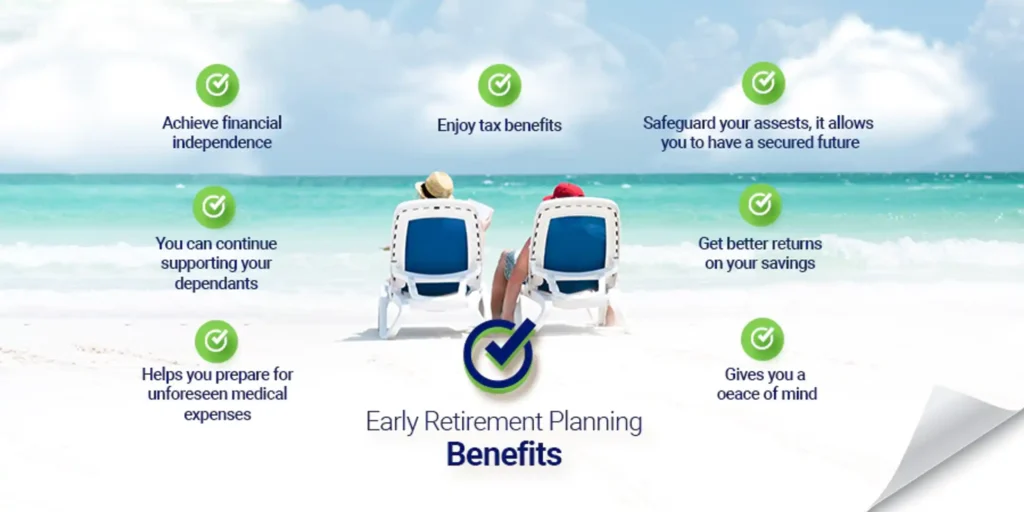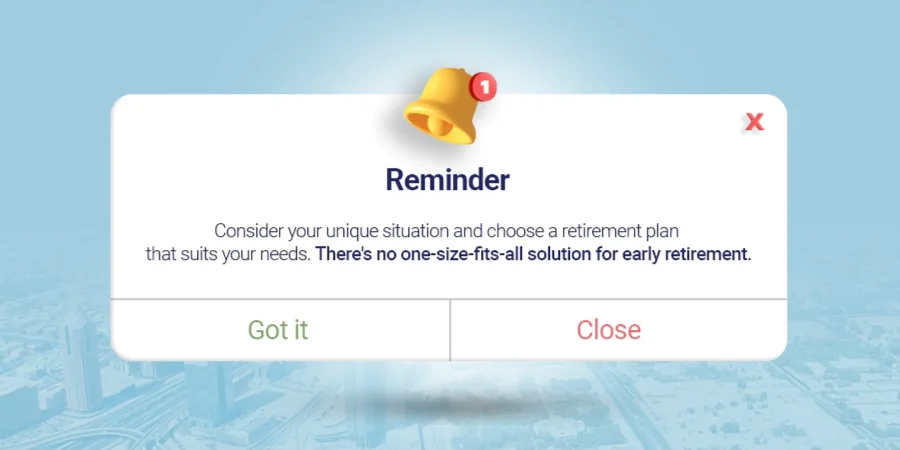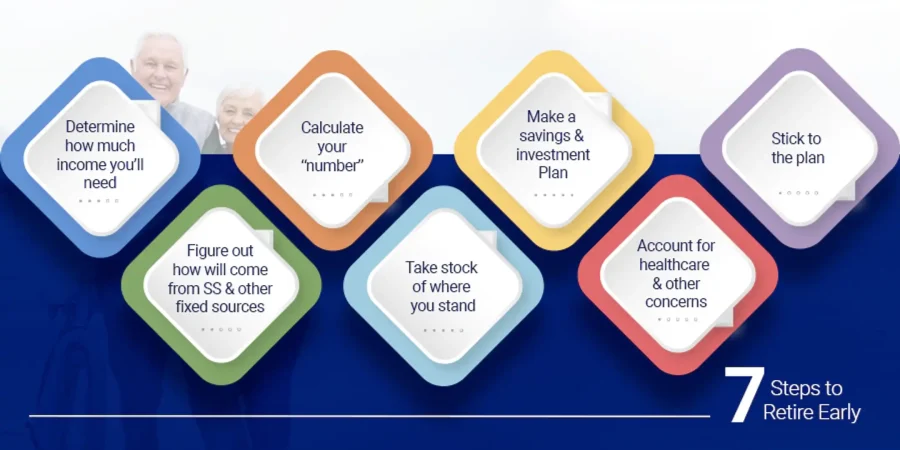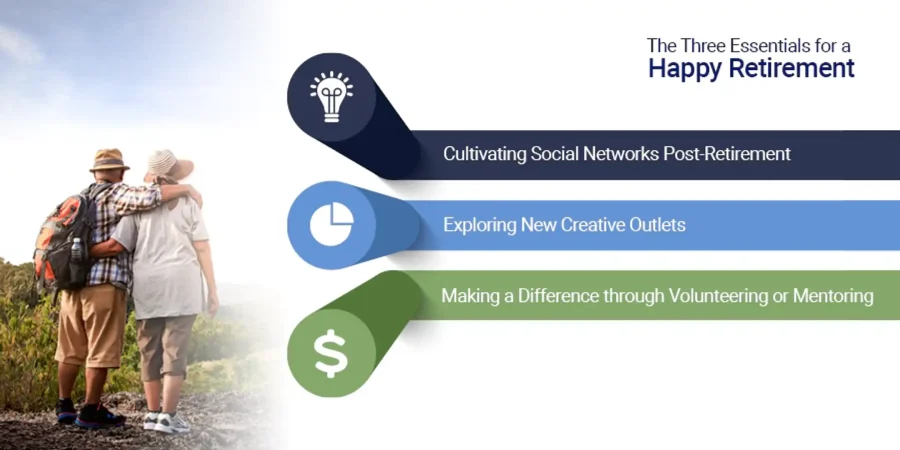In This Article
Early Retirement Planning: Proven hack for a Fulfilling Life

Imagine yourself lounging on a serene shoreline, savoring a delectable beverage, and reaping the rewards of your diligent planning. You’ve successfully achieved early retirement and are now living life to the fullest.
Doesn’t that sound appealing?
Having a plan for retiring early is an ambitious goal that many aspire to achieve. It requires discipline, determination, and a strong financial strategy.
But with careful consideration and the right guidance, it’s possible for even high-earning expatriates in the UAE to retire early. In this blog post, we’ll explore various aspects of retiring early- from maximizing life satisfaction during peak years to prioritizing health considerations.
We’ll delve into strengthening relationships during retirement and discuss when not to retire early. We will also share financial advice from retirees who have successfully navigated their way through this exciting journey.
So sit back, relax, and let us guide you through the intricacies of achieving financial freedom for an unforgettable retired life!
The Importance of Time in Retirement: Making the Most of Your Golden Years
Let’s face it, time is our most valuable asset, and we should use it wisely while we still can. That’s where retirement plans come into play.
Quadra Wealth helps expatriates and residents in the UAE achieve financial freedom by providing consistent growth to their investment portfolios through structured notes. Their services cater to CXO-level expatriates.

Maximizing Life Satisfaction During Peak Years
The sooner you retire, the more time you have to focus on what truly matters – like pursuing your passions or traveling the world. Having devoted years of effort to your career now is the time to reap the rewards and enjoy life’s opportunities.
- Goals & fulfillment.
- Peak capabilities.
- Success & satisfaction.
- Financial stability.
- Exploration & richness.
- Missed opportunities & regrets.
- Declining abilities.
- Unfulfillment & dissatisfaction.
- Financial strain.
- Lower quality of life.
Utilizing Free Time for Personal Growth

Beyond leisure activities, early retirement allows you to invest in yourself and grow as a person. Planning for retirement ahead of time is a wise move and the initial step to take is computing your retirement funds with an early retirement calculator.
- Self-reflection & growth.
- Self-awareness & fulfillment.
- New interests & skills.
- Creativity & innovation.
- Mental well-being.
- Stagnation & unfulfillment.
- Missed skill development.
- Limited self-awareness.
- Increased stress & burnout.
Engaging in Physical Activities and Hobbies
Early retirement means more time for activities that keep you healthy and active. According to the Harvard Health Blog, regular exercise can improve memory and thinking skills – so why not take advantage of those extra years?
- Health & well-being.
- Energy & vitality.
- Stress relief & relaxation.
- Social interactions & connections.
- Satisfaction & fulfillment.
- Health risks & problems.
- Low energy & sedentary lifestyle.
- Increased stress & decreased well-being.
- Limited social interactions.
Prioritizing Mental Well-being
Mental health is just as important as physical health during retirement. By retiring early, you have more time to focus on self-care, relaxation, and mindfulness practices that promote mental well-being.
It’s important to consider medical care options, such as a health savings account, and to consult with a financial advisor to ensure your retirement nest egg is sufficient to cover medical care costs and other expenses.
Remember, with longer retirement comes the need for multiple income streams. Societal security benefits and investment accounts, such as a Roth IRA, can provide additional retirement income.
It’s also important to consider employee benefits and health insurance coverage until your full retirement age of 65. When it comes to withdrawing money during retirement, a common rule of thumb is to withdraw 4% annually to ensure your retirement accounts last.
Nevertheless, a financial expert should be consulted to decide the most suitable approach for one’s own circumstances and objectives in terms of investment returns.
- Resilience & coping.
- Improved mental health.
- Self-awareness & understanding.
- Better relationships.
- Life satisfaction.
- Mental health vulnerability.
- Poor coping abilities.
- Impact on relationships.
- Lower life satisfaction.
- Missed personal growth.
Key takeaways
Quadra Wealth helps expatriates and residents in the UAE achieve financial freedom through structured notes, enabling them to retire early and maximize their time for personal growth, physical activities, mental well-being, and multiple retirement income streams. It's important to plan ahead and estimate your retirement expenses using an early retirement calculator and consulting with a financial advisor can help with the best strategy that suits individual needs. Remember: time is our most valuable asset.
Health Considerations When comes to Early Retirement Planning
Let’s be honest, we all desire to experience our retirement years in optimal health, correct? Well, early retirement might just be the key to achieving that financial goal. Here’s why:
Engaging in Physical Activities and Hobbies
Fact 1: Retiring early means more time for physical activities and hobbies.
Fact 2: Staying active can significantly improve your overall health and well-being.
The takeaway? Early retirement allows you to prioritize your health by engaging in physical activities that keep you fit and happy.
Prioritizing Mental Well-Being
Mental health matters too.
Retiring early can help you prioritize your mental well-being by giving you more time to focus on activities that bring you joy and fulfillment. Whether it’s traveling, spending time with loved ones, or pursuing a passion project, early retirees can help you reduce stress and improve your overall quality of life.
Access to Healthcare
One of the biggest concerns for retirees is access to medical care. However, retiring early can actually be a smart idea when it comes to medical care.
By retiring before age 65, you can take advantage of a health savings account (HSA) to save money on medical care expenses.
Retiring early could let you benefit from a tax-free HSA contribution to pay for qualified medical costs, in the event of having a high-deductible health plan.

- Timely & effective care.
- Preventive measures are available.
- Specialized treatments are accessible.
- Improved recovery & quality of life.
- Peace of mind.
- Delayed or inadequate care can lead to worsened health conditions and complications
- Limited preventive measures can increase the risk of undetected or untreated diseases.
- Reduced treatment options.
- Higher financial burden.
- Increased anxiety.
Financial Independence
Retiring early can also give you financial freedom. Saving aggressively and investing prudently can enable you to accumulate a comfortable retirement fund, enabling early retirement.
However, it’s important to work with financial advisors to ensure that you’re making the most of your investment accounts and maximizing your investment returns.
- Freedom of choice.
- Reduced stress/anxiety.
- Pursue passions freely.
- Sense of security.
- Ability to support others.
- Limited choices/opportunities due to financial constraints and dependencies.
- Higher stress levels and anxiety are related to financial instability and uncertainty.
- Limited ability to pursue personal passions, hobbies, or experiences due to financial limitations.
- Vulnerability to crises.
- Lower quality of life.
Planning for a Longer Retirement
One of the biggest challenges of retiring early is planning for a longer retirement. With people’s lifespans increasing, it is essential to ensure that your retirement funds are sufficient for the extended duration of life.
One strategy is to withdraw 4% of your retirement savings each year, adjusting for inflation, to ensure that you don’t run out of money.
Additionally, it’s important to consider other income streams, such as societal security benefits, to supplement your retirement accounts.
- Comfortable retirement lifestyle.
- Meaningful activities/travel.
- Reduced financial stress.
- Freedom to explore.
- Financial insecurity.
- Longer work or difficulties.
- Limited leisure activities.
- Higher stress/anxiety.
- Less fulfilling retirement.
Leaving Work Behind
Retiring early means leaving work behind, which can be both exciting and daunting. However, it’s important to remember that retirement doesn’t mean you have to stop working altogether.
Many retirees choose to work part-time or pursue a passion project to stay engaged and active.
- Freedom and control.
- Reduced stress/health benefits.
- Pursue personal interests.
- More time for loved ones.
- Higher life satisfaction.
- Limited freedom/schedule control.
- Higher stress/health risks.
- Reduced time for personal pursuits.
- Lower life satisfaction.
- Missed personal growth.
Step 1: Start Planning Early

Planning to retire early is key to achieving your retirement goals. Start by assessing your current financial situation and setting a retirement savings goal.
Consider your employee benefits, such as a 401(k) or Roth IRA, and make sure you’re taking advantage of any employer-matching contributions.
Consult with a financial expert to build a retirement plan that suits your objectives, risk tolerance, and timeframe.
Retiring early is a dream for many, but it’s important to plan carefully to ensure that you can achieve your retirement goals.
By prioritizing your health, planning your personal finances for a longer retirement, and working with a financial advisor, you can early retire and live the life you’ve always dreamed of.
- More time to save.
- Compound interest benefits.
- Financial flexibility.
- Informed retirement choices.
- Confidence and peace of mind.
- Limited time to save.
- Missed compound interest.
- Reduced financial flexibility.
- Unrealistic goals.
- Higher stress levels.
Key takeaways
Planning for retiring at your earliest can help prioritize physical and mental well-being, provide access to medical care through a health savings account (HSA), offer financial freedom and achieve financial independence, and allow retirees to plan for a longer retirement. It's important to start planning early by assessing current financial situations, taking advantage of employee benefits, working with financial advisors, and considering other income streams like societal security benefits. Retiring early doesn't mean stopping work altogether; many retirees choose to work part-time or pursue passion projects.
Strengthening Relationships During Retirement
Life is brief, and fostering connections with family and friends can be an integral part of a rewarding retirement.
According to a hospice nurse, two out of five common regrets among individuals nearing their end of life were working too much and not staying in touch with friends.
This brings us to early retirement as an opportunity to invest more time into these valuable connections.
Reconnecting with Old Acquaintances
The beauty of early retirement lies in the freedom to reconnect with old acquaintances without worrying about work schedules or deadlines. You can now attend reunions, plan meet-ups, or even travel together.
Research suggests that rekindling friendships from our past can have a positive impact on mental health and overall well-being during retirement years.
Fostering Deeper Bonds within Families
Beyond friendships, early retirement allows you to spend quality time building deeper bonds within your family circle – something often neglected due to career demands during our prime years.
Taking trips together, engaging in shared hobbies, or simply having meaningful conversations over dinner are just some ways you can strengthen familial ties while enjoying your newfound freedom from work commitments.
Here are some ideas on how to make family time more meaningful and enjoyable during retirement:
- Plan a family vacation to a destination everyone has always wanted to visit
- Start a family book club or movie night tradition
- Volunteer together for a cause that everyone is passionate about
- Take up a new hobby or activity together, such as hiking or cooking classes
In a nutshell, the guide to early retirement provides the perfect opportunity to focus on what truly matters – our relationships with those we hold dear.
So why not seize this chance to create lasting memories and forge stronger connections that will enrich your life in ways you never thought possible?
- More time for relationships.
- Deepened connections and memories.
- Enhanced emotional support.
- Stronger support network.
- Increased life satisfaction.
- Limited time for relationships.
- Risk of isolation and loneliness.
- Strain on relationships.
- Lack of support network.
- Decreased life satisfaction.
Key takeaways
Retiring early offers the opportunity to save and invest more time in valuable relationships with family and friends. Reconnecting with old acquaintances can have a positive impact on mental health while fostering deeper bonds within families through shared activities and traditions can create lasting memories and enrich life during pension years.
The Three Essentials for a Happy Retirement: A Comprehensive Guide

Alright, let’s dive in.
To make the most of your retirement years, we’ve identified three key aspects to focus on – connection, creativity, and contribution.
These essentials will ensure that you live a fulfilling life even after leaving your career behind.
So without further ado, here are the three essentials:
Cultivating Social Networks Post-Retirement
1: Connection – Maintaining strong social ties is crucial for overall well-being during retirement. Join clubs or organizations where you can meet like-minded individuals and form new friendships.
Meetup is a great resource to help you find local groups and activities.
- Expanded social circles.
- Increased engagement and participation.
- Enhanced well-being.
- Potential for new friendships.
- Continued personal growth.
- Social isolation and loneliness.
- Reduced access to activities.
- Higher risk of mental health issues.
- Missed growth opportunities.
- Less fulfilling post-retirement life.
Exploring New Creative Outlets
2: Creativity – Pursue passions that bring joy and personal growth into your life post-retirement. This could include painting classes, writing workshops, or learning an instrument – anything that sparks inspiration.
Creative Boom has some great tips on how to unleash your inner creative genius.
- Self-expression and creativity.
- Personal growth and self-discovery.
- Enhanced well-being.
- New hobbies and passions.
- Increased life satisfaction.
- Limited self-expression.
- Missed personal growth opportunities.
- Unfulfilled creative potential.
- Higher susceptibility to stress.
- A less fulfilling life.
Contributing Meaningfully Through Volunteering or Mentorship
3: Contribution – Giving back not only enriches the lives of others but also provides a sense of purpose and fulfillment in your own life. Consider volunteering at local organizations or mentoring younger individuals who could benefit from your wisdom and experience.
VolunteerMatch is an excellent platform to find meaningful opportunities for retirees. To ensure a joyful retirement experience, prioritize connection, creativity, and contribution.
Ready to take charge of your retirement journey? Contact Quadra Wealth today.
It’s time to embark on the thrilling adventure of retirement – seize this opportunity and make it your own.
Key takeaways
Secure a happy retirement by cultivating social networks, exploring new creative outlets, and contributing meaningfully. Learn more with Quadra Wealth.
- Positive impact on others.
- Sense of purpose and fulfillment.
- Expanded social networks.
- Personal growth and self-esteem.
- Improved life satisfaction.
- Missed impact opportunities.
- Reduced purpose and fulfillment.
- Limited social connections.
- Decreased personal growth.
- Less satisfying life.
When Not To Retire Early: Assessing Your Unique Situation
So, you want to retire early?
Before taking the plunge, let’s explore some factors that might make it worth postponing your golden years.
Assessing the Impact of Work on Overall Well-being
Your career may be fulfilling and not causing undue stress – if so, kudos to you.
In this case, think twice before you retire early; a potentially boring transition period could leave you feeling unfulfilled. It’s important to note that staying engaged in meaningful activities is crucial for mental health when you’re saving for retirement.

Evaluating Financial Readiness for Early Retirement
The numbers don’t lie – ensure your personal finances are in order before bidding adieu to your job. Experts recommend having at least 25 times your annual expenses saved up before retiring.
- Create a detailed budget projection for post-retirement life.
- Analyze current savings and investment plans to determine if they’ll sustain you throughout retirement solutions.
- If needed, consult with a retirement specialist, like Quadra Wealth, who can provide personalized advice based on your unique situation.
Remember, no single solution is ideal for everyone when it comes to retire early. Take the time to weigh your individual situation and make a well-informed decision that caters to your wants and needs.
Ready for more insights on planning to retire early?
Advice from Retirees: Learning from Others' Experiences
By listening to those who have retired, we can gain valuable insight into how best to prepare for early retirement. Many retirees in their 60s strongly advise others to retire sooner rather than later, emphasizing the importance of seizing opportunities while still young and healthy.
Taking Control of Your Own Retirement Journey
The decision to retire early is ultimately a personal one, but there are some universal tips that can help guide you on your journey:
- Step 1: Start with an early retirement calculator, which will give you a clear picture of how much money you’ll need in your nest egg based on factors like age, income streams, and desired lifestyle during retirement.
- Step 2: Create a comprehensive savings plan. Consider maximizing contributions to investment accounts such as Roth IRAs, employer-sponsored plans (e.g., 401(k)s), or other tax-efficient vehicles like health savings accounts (HSAs).
- Step 3: Consult with a financial advisor specializing in retirement planning. A professional in retirement planning can offer personalized advice on how to reach your desired early retirement and guarantee you have financial security during the later years in the market.
- Step 4: Develop multiple income streams, such as rental properties or side hustles, to supplement social security benefits and investment return. This will help create a more stable financial foundation during retirement.
- Step 5: Prioritize living below your means and saving money wherever possible. Remember that every dollar saved today can have a significant impact on the longevity of your retirement nest egg.
Taking control of your own retirement journey is not only a smart idea but also an empowering one. The sooner you start planning for early retirement, the better equipped you’ll be to make informed decisions about when and how best to leave work behind in pursuit of personal growth, relationship-building, and overall life satisfaction.
- Personal choice and alignment.
- Autonomy and independence.
- Customized retirement lifestyle.
- Empowerment and control.
- Higher life satisfaction.
- Limited control and reliance.
- Reduced autonomy and independence.
- Potential dissatisfaction or regrets.
- Feeling overwhelmed or directionless.
- Lower life satisfaction.
Key takeaways
Retirees advise seizing opportunities while young and healthy. To plan for early retirement, use an early retirement calculator, create a savings plan, consult with a financial planner specializing in retirement plans, develop multiple income streams, and prioritize living below your means to save money wherever possible. Taking control of your own retirement journey is empowering and helps you to attain financial freedom.
Frequently Asked Questions
The 4% rule is a guideline used to determine how much one can withdraw from retirement savings annually without running out of money. It suggests withdrawing 4% in the first year and then adjusting that amount each subsequent year for inflation in the market. This investment strategy aims to provide a steady income stream throughout retirement while preserving the principal.
The 25x rule states that you should have at least 25 times your desired annual expenses saved before retiring. This calculation assumes a safe withdrawal rate of 4%, meaning if you want to make an annual income of $100,000 during retirement, you need to save $2.5 million (100,000 x 25) beforehand.
Having a plan for retiring early allows individuals more time to accumulate wealth and take advantage of compound interest. It also provides flexibility in case unforeseen circumstances arise or goals change over time. Starting early helps ensure financial security and reduces stress related to funding post-work life.
To retire with an annual income of $100,000 using the aforementioned 25x rule, you would need to save $2.5 million (100,000 x 25). This assumes a 4% withdrawal rate and aims to provide a steady income stream throughout retirement while preserving the principal.
Conclusion
Having a plan for retiring early is a crucial step toward creating a detailed retirement budget and ensuring a fulfilling and satisfying retirement.
By prioritizing time, health, relationships, and happiness, individuals can maximize their post-retirement years and achieve true contentment.
At Quadra Wealth Management, we specialize in helping expatriates at the CXO level plan for early retirement through comprehensive financial planning services.
We understand that planning for retiring early can be overwhelming, but with our expert guidance, you can take control of your own retirement journey.
If you’re ready to start planning for retiring early and want to spend quality time, contact us today to learn more about how we can help you achieve your goals!
Should I talk to a Financial Advisor When Buying a House?
In This Article Are you planning on purchasing your first home? Or thinking of splurging
Master Robert Kiyosaki: 10 Keys to Financial Freedom
In This Article Have you ever felt the earn, spend and save trilogy too mundane?

Can SIPs Make You Rich? Mutual Fund SIP Grow Your Wealth
In This Article Can SIPs make you rich? Systematic Investment Plans can help in wealth

Exclusive Investments of Elon Musk: Disruption, Vision, and Risk
In This Article A visionary entrepreneur who has been a consistent disruptor in the way


